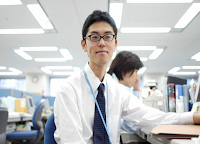I'm addicted to making beer lately. Actually, it takes two weeks for fermentation and adds two more weeks for second fermentation after bottling. In addition, it requires to pay attention to sanitization and temperature. It goes without saying buying beers at liquor shop is cheaper, easier and faster compared to making beer by myself.
However, I want to say "It's fun". It's not dout convenience, it's more about the fun. I think it's fun to learn how to make beer and to serve my beers to my friends and get opinion. It's impossible to do same thing by buying beer. I think people who enjoy in home vegetable gardens have same feeling.
Why do people feel happy with inconvenience and pain things even though there are a tons of convenient and easier ways.
I think the key is that "Convenience" and "Fun" feel similar, but actually these are completely different, isn't it?
"Easy" and "Convenient" things solve inconvenience and pain. However, does it makes us happy? The answer is not always "Yes" isn't it?
For instance, even though computers improved and we can work more efficiently, we never get our free time. Even though transportation technologies improved and we can move much faster than current, our business trip time would be shortened. It's unwelcome favor, but latest air craft allow us to use computer during our flight then we have to work instead of relax. Our free time is shortened and we would get more stressed, wouldn't we?
Also, many mothers are still saying "no time" ,"so busy" and "I'm tired" even though they use tons of products to help their house chores like automatic laundry machine, robot cleaner, microwave and ready-made dishes.
I think these examples are typical cases that if people want to get only efficiency in their daily life, people never feel happy even though they use any convenient products and services.
In addition, if we keep having "easy" and "convenient" experience, it would be as normal things and we can't realize that we are happy. Also, once we lose these convenient stuff, we would become anxious in our daily life.
Meanwhile, even though it's difficult, tough and hard, there are a lot of fun things.
Not only making beer and home vegetables, but going outdoor and camping and making cake and well-prepared dish take much time and are difficult as well. However, we can spent our own time and have a joy of achievement.
Yes, it's filled with a variety of joys.
There is big a difference between thinking of "waste of time and no meaning" and "Interesting and fun to do"
Whether it has a value or not is entirely dependent on if people can reconsider their value based on their own feeling, not thinking of efficient priority.
Actually, there are big values and fun in the things that we cut before as inconvenient things. Also, there are a lot of things we can do from today like to stop using smart-phone and talk to people who live in local area while traveling and to stop using transportations and walk to enjoy the changes of the seasons.
I hope to change my mind and to live more slowly for more joy.
Reference "Yukkuri de iindayo" by Shinichi tsuji
Written in Oct 02 2012 and revised
日本語
最近自家醸造ビールにはまっている。1次発酵に2週間、ボトルに詰めてからの2次発酵に2週間もかかる。加えて殺菌処理も気を使うし温度管理もシビアです。もちろん買った方が安くて楽チンですぐ飲めるのは言うまでもない。
でも楽しいのだ。便利か不便かという価値観ではなく楽しいか楽しくないかということだ。好きなビールがどうやって作られているのかを知るのは楽しいし出来たビールを友達に振る舞まって感想を聞くのも楽しいのだ。これは買って来たビールには出来ない喜びだと思う。家庭菜園でいろんな野菜を作ってる人も同じ気持ちだと思う。
ではなぜこれだけ世の中には便利でラクチンなものがあふれているのにひとはあえて不便でめんどくさい事を逆に楽しいと思うのでしょうか?
キーワードは「楽なこと」と「楽しいこと」は似ているようで全く違うという事ではないでしょうか。
「楽」や「便利」はいろんな不便やめんどくさい事を解消してくれます。でもそれが幸せに結びついているか、というと必ずしも「YES」とは言えないのではないでしょうか。
例えばPCが進化して早く効率よく仕事ができるようになっても私たちの自由時間は増えません。乗り物が進化して早く移動出来るようになっても出張日程を短縮されるだけだし、ありがたい事に飛行の中でもPCが使えるようになって仕事もできるようになりました。逆に時間に追われてストレスが増えているのかもしれません。
また、世の中のママも全自動洗濯機、掃除ロボット、電子レンジ、スーパーの総菜などママの仕事を楽にしてくれる物があふれていますが相変わらず「時間がない」「忙しい」「疲れた」と言ってますね。
効率だけを求めるといくら楽で便利な物を投入しても幸せに感じる事ができない典型的な例だと思います。
また、「楽」や「便利」ばかりが続くと、それが「当たり前」になり、「幸せ」と思えなくなりがちです。逆にそれがなくなるととたんに生活が成り立たなくなります。
一方、反対に、難しくても、大変でも、苦しくても、楽しいことはあります。
ビール作りや家庭菜園だけでなくアウトドアでキャンプしたり登山したりケーキや凝った料理を作ることは不便で手間ひまがかかるけど自分らしい時間が過ごせたり達成した喜びなどいろんな楽しさに満ちあふれています。
それを「無駄なこと」「意味がないこと」などと考えるか、「おもしろいこと」「楽しめること」などと考えるか、では大きく違ってきます。
それに価値があるかどうかは、効率優先ではなく、自分の心の価値を大切に考え直すことができるかどうかで決まります。
例えば旅先でネットで調べないであえて地元に人に話しかけてとっておきな情報を手に入れたり、乗り物に乗らないであえて歩いて季節の移ろいを見つけてみたりと今まで私たちが無駄と切り捨てていたところに実は楽しさが隠れているという事を今一度見直してゆっくりと生きて行きたいですね。


